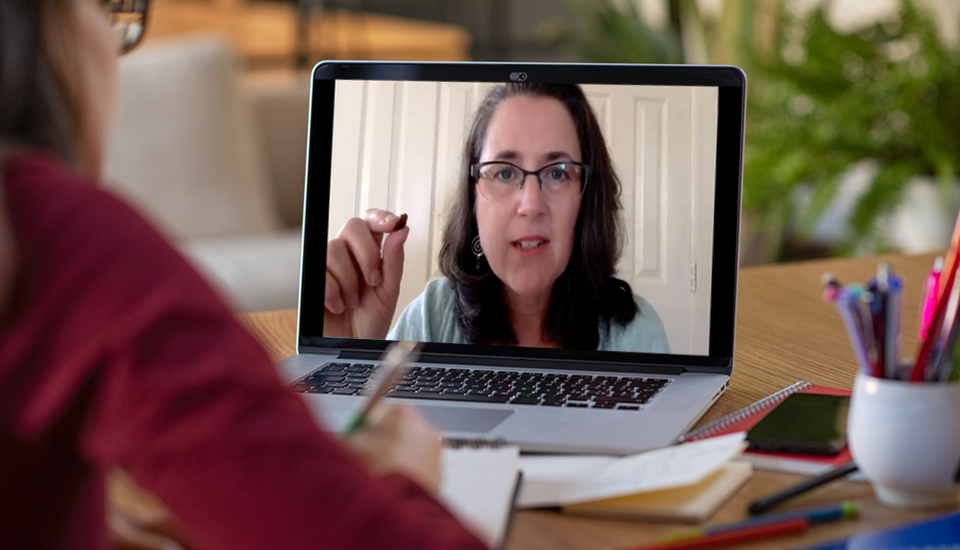

Welcome to East Coast Mindfulness
East Coast Mindfulness is proud to be listed as one of Jon Kabat-Zinn’s Mindfulness Connections for MBSR Training.
"East Coast Mindfulness provides expert online MBSR teaching and high level training for others to teach the MBSR course with high integrity and depth.”
The mission of East Coast Mindfulness (ECM) is simple: to provide excellent online mindfulness programs for living authentic, healthy, happy lives.
When the Center for Mindfulness (CFM) at University of Massachusetts Medical School closed in July 2019 after almost 40 years, CFM Teacher Trainers Rebecca Eldridge & Margaret Fletcher formed East Coast Mindfulness (ECM) to continue offering programs globally.
Always online. Your space. Your time zone. Your life.
Your information will never be shared
with 3rd parties.
ECM offers online mindfulness programs for the general public, as well as for organizations small and large.




Ongoing Programs
Take an MBSR Course Online

This course requires a commitment, but the experience can forever alter the way you experience yourself and your life. Most people who participate fully in an MBSR course report decreases in physical and psychological symptoms, an increased ability to relax, reduction in pain levels, an enhanced ability to cope with chronic pain, greater energy and enthusiasm for life, improved self-esteem, and an ability to cope more effectively with stressful situations.
Join the Mindfulness Grad Online Community

The Mindfulness Grad Online Community (MGOC) gathers monthly under the guidance of MBSR Teacher and Teacher Trainer Rebecca Eldridge for continued learning, practice, and community.
The MGOC is open to graduates of any organization's 8-week Mindfulness-Based course (such as MBSR, MBCT, MSC, and so on) that was held live either in person or online. Sessions are held on the second Sunday of each month. Join as few or as many monthly sessions as you'd like.
During each session, we will explore various mindfulness topics through teachings, practice, silent reflection, and speaking & listening.
All graduates are welcome!
Join the Global MBSR Teachers' Meeting

The East Coast Mindfulness Global MBSR Teachers’ Meeting (MBSR-TM) will gather monthly for learning, professional development, and community building.
Held on the second Sunday of each month, the MBSR-TM is open to MBSR teachers of all experience levels who want to learn, grow, and be in community with other MBSR Teachers and with MBSR Teacher Trainer Rebecca Eldridge. No matter when you initially trained to teach MBSR, or through which organization you trained, hopefully you never want to stop learning—about teaching MBSR and about yourself as a human and as an MBSR teacher.
During sessions, we will explore topics related to MBSR and teaching MBSR. These may include assumptions about what MBSR is and what it is not; what “good teaching” of MBSR is and what it may not be; what it means to practice mindfulness and MBSR; the underpinnings of MBSR curricula; best practices of teaching MBSR; your personal and professional experience of teaching MBSR; your questions and wonderings; your own meditation practice; and more.
How to Start a Mindfulness Meditation Practice

"When you dwell in stillness, the judging mind can come through like a foghorn...Imagine how it might feel to suspend all your judging and instead to let each moment be just as it is, without attempting to evaluate it as 'good' or 'bad.' This would be a true stillness, a true liberation. Meditation means cultivating a non-judging attitude toward what comes up in the mind, come what may.”
Free Online Intro to Mindfulness

Whether you’re new to mindfulness or exploring further, please join us for an hour of free mindfulness.
During this live online opportunity, you will—
- Learn about mindfulness
- Experience short practices to try out in your everyday life
- Learn about practice opportunities within an active online worldwide community
Free Worldwide Online Sit
This offering is open to all who have completed an MBSR, MBCT or MSC course, or have learned about mindfulness from some other source.
The session is held every Thursday, 12:15 - 12:45PM US Eastern Time. Once you register for this free offering, you will be emailed a Zoom link to use again and again. We’d love to have you participate every Thursday you’re able to be with us.
Graduate Offerings

East Coast Mindfulness is happy to offer ongoing opportunities for students to connect with a community of mindfulness practitioners and teachers.
Along with our free, weekly Worldwide Online Sit and our online retreats, we provide specialized programs for MBSR and MBCT graduates who wish to continue their learning and development in mindfulness.
Train to Teach MBSR

Train to Teach MBSR Online

“East Coast Mindfulness is offering an online course to train MBSR teachers to teach the MBSR curriculum online. I have every confidence that this valuable professional training can amplify and deepen your skillset and personal practice as an MBSR teacher, as well as the technical support necessary to extend your reach through the internet.”
We also offer a 3-day Introduction to Teaching MBSR Live Online course, to help new MBSR teachers identify what is essential in each class of an MBSR course, and gain practical experience in expressing the essence of those classes through the online format.
Mindfulness Training for Your Organization
Read more about organizations we've served.
Online One-to-One Mindfulness Sessions
Special Programs
Building the Temple:A Day of Practice Focused on the Union of Aspiration and Compassion
Sunday, March 22, 2026 with Saki Santorelli

Amidst the stillness, crystalline clarity, and deep solitude of Winter, we'll enter into a day of practice, offering our aspirations and attention to the building of the universal temple, the inner sanctuary that is none other than your heart. Through extended periods of guided and silent meditation from the Buddhist and Sufi traditions, illuminating poetry, and brief periods of sobhet – deep listening and spiritual conversation as referred to by the Sufis - we’ll take our seat at the feast. Learning to taste and savor directly this “monastery of your heart,” we’ll explore the universal call to dedicate ourselves to manifesting this inner temple in our everyday lives and actions.
All are welcome...
Saki F. Santorelli, EdD, MA is an educator, meditation guide, writer, gardener, and pioneer in integrating meditation and mindfulness into medicine, health care, and the broader society. In 2017, he retired as professor of medicine, executive director of the Center for Mindfulness in Medicine, Health Care, and Society and director of the internationally acclaimed Stress Reduction Clinic – the clinic of origin of mindfulness-based stress reduction (MBSR) - at the University of Massachusetts Medical School.
Photo credit: © Saki Santorelli
The Brain on Mindfulness:For Mindfulness Teachers & Professionals (and those interested in brain science)
Saturday, April 18, 2026 with Dr. Gus Castellanos

No prior neuroscience background is required for this experiential, research-informed workshop which weaves together brief practice, accessible neuroscience, and reflective dialogue. Topics include how the standard MBP practices engage different neural systems, what current neuroscience supports, questions, and has yet to clarify, why the same practice can be stabilizing for one person and challenging for another, common myths and oversimplifications in mindfulness-and-the-brain narratives, and more.
Gus Castellanos, M.D., is a retired, board-certified neurologist and sleep-medicine specialist with over 25 years of clinical experience. Since 2009, he has focused on teaching Mindfulness-Based Stress Reduction and other mindfulness-based programs across healthcare, education, correctional institutions, and community settings.
Gus is certified to teach MBSR by the University of Massachusetts Center for Mindfulness and has trained in Mindfulness-Based Attention Training (with Amishi Jha) and Mindfulness-Oriented Recovery Enhancement (with Eric Garland). He has also been an active participant in Jud Brewer’s Mindshift Recovery community since its inception, engaging in ongoing dialogue at the intersection of mindfulness, neuroscience, and behavior change. He has served as a consultant, program developer, and researcher on mindfulness-based programs for multiple universities and PhD candidates, including current work at Florida International University.
A self-described “neuro-nerd,” Gus brings an integrative, evidence-based, and contemplative lens to understanding how mindfulness affects the brain, including where its effects are often misunderstood or overstated.
Photo credit: © Gus Castellanos, M.D.
The Virtues & Challenges of Lying Down Meditation
With Jon Kabat-Zinn and Rebecca Eldridge

In this workshop, we will focus on the unique virtues of lying down meditations and how such practices can be seamlessly integrated into our daily lives.
Join Jon Kabat-Zinn and Rebecca Eldridge as they discuss the virtues, challenges, and opportunities of lying down meditation. Jon will also guide a brief period of lying down practice, and engage in dialogue with the participants about their experiences. This is an excellent opportunity to explore inwardly and outwardly what lying down meditation practices might hold for you.
Missed the live sessions? The recordings are now available on Jon Kabat-Zinn's website!
Photo credit: © Joshua Simpson
Spread the word about East Coast Mindfulness via Facebook, LinkedIn, or E-mail!
Connect with East Coast Mindfulness on our social channels:
Questions? Contact us!
